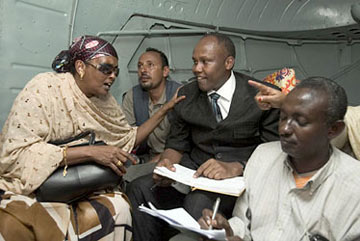
Mohammed Hussein Farah Aidid, center, head of the Somali Transitional Government, flying with his entourage to the newly liberated Mogadishu, December 28, 2006.
In an earlier incarnation, Aidid was — and some say still is — commander of a clan militia that ruled a district of Mogadishu from the barrel of a gun. A naturalized U.S. citizen and a Marine who served in the first Gulf War, Aidid was a successor to his father, Mohammed Farah Aidid, the warlord who battled American troops in the Somalian capital in 1993, killing 18, in a bloody street battle made famous by the movie Black Hawk Down. (Mohammed Farah Aidid was killed in 1996.) Today, by virtue of the Byzantine clan structure and shifting power deals that carve up this East African nation, Aidid finds himself Deputy Premier, Interior Minister and Acting Minister for Reconciliation.
Somalia's future hangs on whether the new government can achieve that reconciliation. Since the collapse of the last functioning government in 1992, Somalia has been a prisoner of bloody anarchy, a void filled by vicious and impressively armed chaos, as rival warlords, clans and sub-clans and Islamists prosecuted a series of civil wars — over power, over historic tribal animosities and over competing visions of Islam. Last summer, the Islamist Courts Union — an alliance of clerics and clan leaders — took over Mogadishu and forced the warlords out. In the last two weeks, the T.F.G, backed by thousands of troops from neighboring Ethiopia, several key warlords and, tacitly, the U.S. State Department, has taken most of the country in a lightning advance, cornering what remains of the Islamists in a small, deeply forested area in the southeast of the country near the Kenyan border. U.S. intelligence is focused on this last group, said to contain scores of foreign jihadi fighters from across the Middle East and South Asia, including three men suspected of being behind the bomb attacks on the American embassies in Kenya and Tanzania in 1998 that killed more than 250.
For the new government, winning the war is only the first step toward reviving a failed state. Aidid, Prime Minister Ali Mohammed Gedi and President Yusuf Abdullai recognize that the new government cannot succeed without disarmament, and an effort to be as inclusive as possible. "We will reconcile with the Islamists, "says Aidid. "All their remnants can join our forces." Both are daunting tasks. Some warlords have already dismissed the new government as a paper authority that will cease to have muscle — and therefore a point — once Ethiopia withdraws its forces. And on Tuesday, Gedi's attempt to persuade Somalis to disarm voluntarily in a three-day weapons amnesty appeared stillborn, when not a single weapon was handed in at collection points around Mogadishu. By evening, Aidid indicated the government realized it had been over-ambitious, saying it had called an emergency meeting Wednesday to hammer out a new disarmament plan and adding that the government would now be happy with a three-month process. Asked why this new try to establish a national government in Somalia would succeed when so many previous attempts had failed, Aidid replied: "This is a great chance. It is not an easy process. Reconciliation must be very aggressive." It's that last sentence that worries Somalia.
